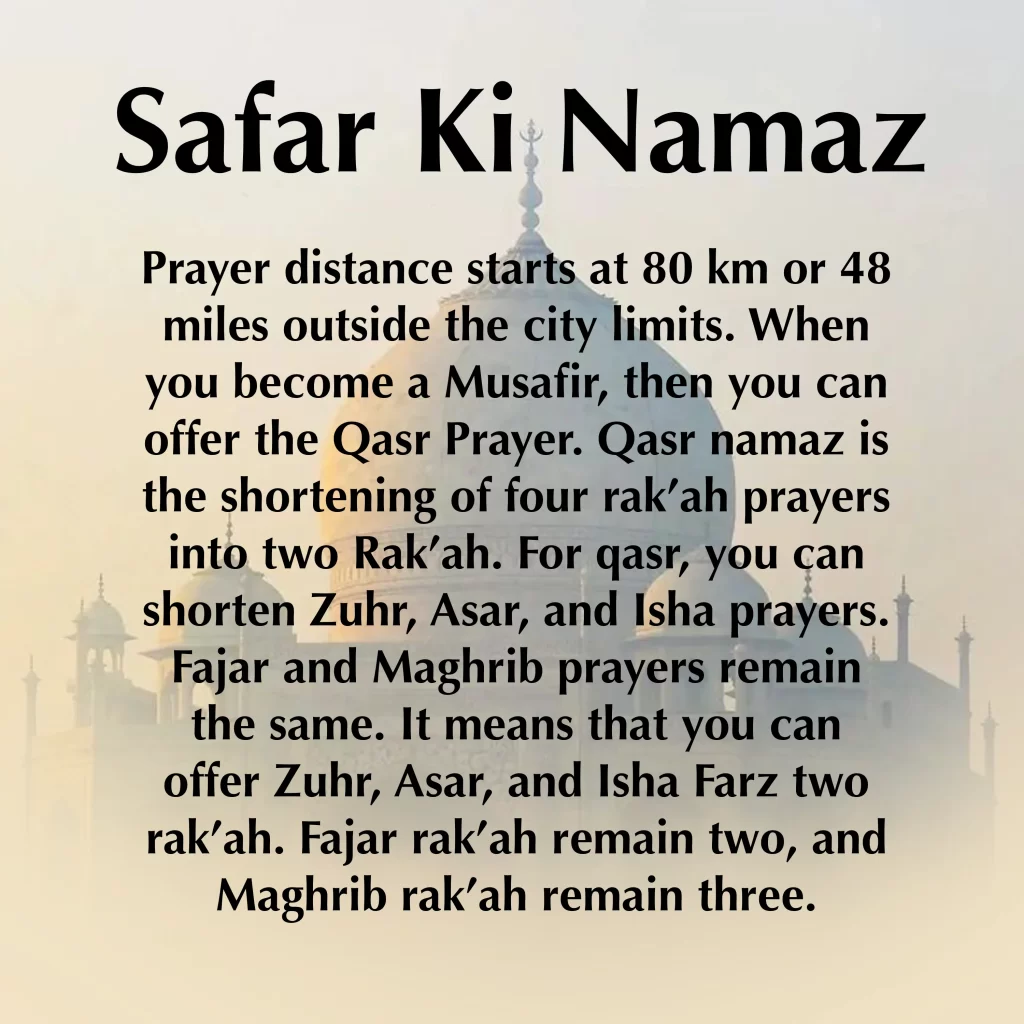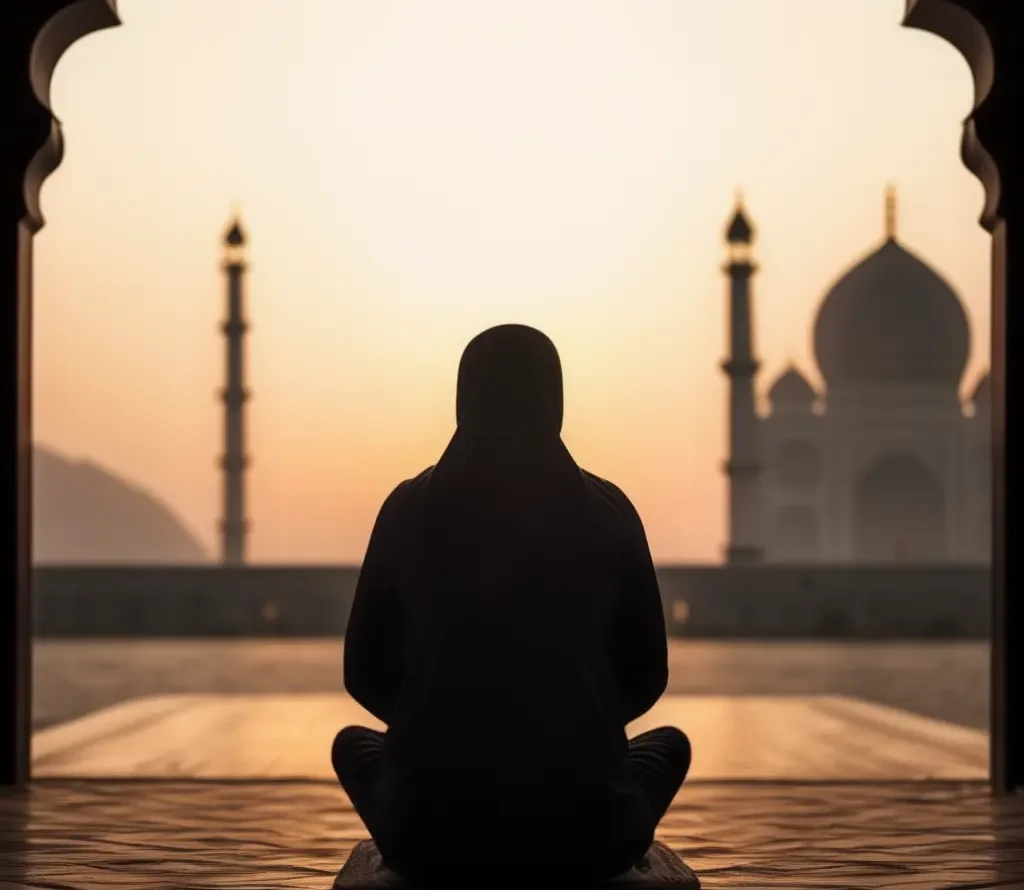Safar Ki Namaz – Travelling Prayer
Prayer is the second important fundamental of Islam. It is the key distinction between a Muslim and someone who is not a non-Muslim. It forbids us from engaging in immoral and sinful deeds. All other fundamentals of Islam, like Fasting, Hajj, and Zakat, can be omitted on special grounds, but a Muslim cannot skip namaz even in illness.

Islam is a very easy religion. Allah has made everything easy in Islam. However, you don’t skip namaz in any condition, but you can offer prayer while sitting or lying in illness. Conversely, during travel, you can shorten the namaz rak’ahs. This is proved by the Holy Quran and Prophet Muhammad (SAW) Sunnah that namaz can be reduced in travel.
In this article, we will give answers to all your questions about safar ki namaz with the Quran and Sunnah. So, let’s begin!
What is Namaz e Qasr – Safar ki Namaz?
Qasr is an Arabic term that signifies reduction. Qasr namaz means the four rak’ah prayers become two rak’ah in the journey. In the Quran, Allah says;
وَ اِذَا ضَرَبۡتُمۡ فِی الۡاَرۡضِ فَلَیۡسَ عَلَیۡکُمۡ جُنَاحٌ اَنۡ تَقۡصُرُوۡا مِنَ الصَّلٰوۃِ ٭ۖ اِنۡ خِفۡتُمۡ اَنۡ یَّفۡتِنَکُمُ الَّذِیۡنَ کَفَرُوۡا ؕ اِنَّ الۡکٰفِرِیۡنَ کَانُوۡا لَکُمۡ عَدُوًّا مُّبِیۡنًا
(Surat No 4 : سورة النساء – Ayat No 101)
جب تم سفر پر جا رہے ہو تو تم پر نمازوں کے قصر کرنے میں کوئی گناہ نہیں اگر تمہیں ڈر ہو کہ کافر تمہیں ستائیں گے ، یقیناً کافر تمہارے کھلے دشمن ہیں ۔
“When you are going on a journey, there is no obligation on you to reduce your prayers if you fear that the disbelievers will persecute you. Indeed the disbelievers are your enemies”
With this Ayat context we came to know that at the beginning of Islam, qasr prayer is for the travelers who are in battle. Later this concession was for all kinds of travelers.
Ibn e Abbas narrated: “The Prophet went from Al-Madinah to Makkah, not fearing anyone except Allah, the lord of the worlds, and he prayed two Rak’ah”.
It is proved that it is an option for Muslims to qasr their prayer, not an obligation. You can pray full namaz or reduce namaz in the journey. It is a concession and a kind of gift of Allah for Muslims. In this way, we have no excuse to skip prayers.
In the beginning, Namaz had just two rak’ats for non-travellers and travellers. As time passed and Islam spread in Madina, Allah Almighty increased the rak’ah of prayer to four for non-travellers.
“Hazrat Aisha narrated: When the prayers were first enjoined they were of two rak’ah each. Later the prayer in a journey was kept as it was but the prayers for non-travelers were completed.”
حضرت عائشہ رضی اللہ عنہا بیان کرتی ہیں: پہلے نماز دو رکعت فرض ہوئی تھی بعد میں سفر کی نماز تو اپنی اسی حالت پر رہ گئی البتہ حضر کی نماز پوری ( چار رکعت ) کر دی گئی ۔
Who is a Musafir (traveller)?
You must be a musafir to perform the Qasr prayer. Musafir comes from another Arabic word المسافر, which means traveller.
According to Shari’ah, Musafir is a person who decides to travel outside the city, and if he stays in travels anywhere for less than 15 days, then he will be called a Musafir.
We find different Ahadith where Prophet Muhammad (SAW) offered Qasr Namaz for 10 days and 19 days, but now Muslim Ummah consensus on 15 days point.
Safar Namaz Distance
There is not a single ayat in the Quran about the distance of qasr salah. So we get guidance from the sunnah. Sunnah is the interpretation of the Quran. From Sunnah, we get to know that Safar Prayer distance starts at 80 km or 48 miles outside the city limits. The journey for safar namaz includes all kinds of travel, whether you are travelling for Hajj, Umrah, business, or staying 80 km away outside your city for a job or any other reason less the 15 days you will be called a Musafir. It also includes a situation where you daily go outside the city approximately 78 km you can offer qasar namaz.
This distance of 78 km starts from outside the boundary of the city, not from home.
Yahya b. Yazid al Hunai reported: I asked Anas B. Malik about the shortening of prayer. He said: When the Messenger of Allah (SAW) covered a distance of three farsakh, he observed two Rak’ahs.
شعبہ نے یحیی بن یزید ہنائی سے روایت کی ، کہا : میں نے حضرت انس بن مالک رضی اللہ عنہ سے نماز قصر کرنے کے بارے میں پوچھا تو انھوں نے کہا : رسول اللہ ﷺ جب تین میل یا تین فرسخ کی مسافت پر نکلتے تو دو رکعت نماز پڑھتے ۔
Traveling Prayer Rakat
When you become a Musafir, then you can offer the Qasr Prayer. Qasr namaz is the shortening of four rak’ah prayers into two Rak’ah. For qasr, you can shorten Zuhr, Asar, and Isha prayers. Fajar and Maghrib prayers remain the same. It means that you can offer Zuhr, Asar, and Isha Farz two rak’ah. Fajar rak’ah remain two, and Maghrib rak’ah remain three.
Optional (Sunnah) Prayers in Traveling
In travel, Prophet Mohammad (SAW) did not perform the Sunnah prayers. He just offered Farz Qasr Namaz. He (SAW) would get off the ride and perform the obligatory (Farz) Prayer facing the Qiblah.
Hadith in the Context of Sunnah Prayer
Narrated Hafs bin Asim: Ibn e Umar went on a journey and said, I accompanied the Prophet, and he did not offer optional (Sunnah) prayers during the journey, and Allah says: Verily! In Allah’s Apostle, you have a good example to follow.
میں نے سفر میں سنتوں کے متعلق عبداللہ بن عمر رضی اللہ عنہما سے پوچھا آپ نے فرمایا کہ میں نبی کریم ﷺ کی صحبت میں رہا ہوں ۔ میں نے آپ کو سفر میں کبھی سنتیں پڑھتے نہیں دیکھا اور اللہ جل ذکرہ کا ارشاد ہے کہ تمہارے لیے رسول اللہ ﷺ کی زندگی بہترین نمونہ ہے ۔
Hadith in the Context of Nawafil
He (SAW) also performed Nawafil with signs while sitting on the ride in any direction.
Narrated Salim Bin Abdullah: Ibn e Umar said, Allah’s Apostle used to pray the Nawafil on the back of his Mount (carriage) by signs facing any direction. Ibn e Umar used to do the same.
رسول اللہ ﷺ اپنی اونٹنی کی پیٹھ پر خواہ اس کا منہ کسی طرف ہوتا نفل نماز سر کے اشاروں سے پڑھتے تھے۔ عبداللہ بن عمر رضی اللہ عنہما بھی اسی طرح کیا کرتے تھے
Namaz with Congregation (Jamat) in Travel
In Islam, praying in a congregation is the best practice. So, if you are a traveller and offering prayer behind the resident (Muqim) Imam, you will perform the full four rak’ahs. And if you are in a condition where the Imam is also a traveller, then both can offer Qasr Salah.
Combining Travelling Prayer
Allah Almighty has also placed another ease in Qasr namaz that you can join prayers. If you are in travel and it is time for Zuhr prayer, you can delay it. You can perform the Zuhr prayer together with the Asr Prayer. Likewise, the Maghrib prayer could be joined with Isha prayer. Fajr prayer must not be joined with any other prayer.It will be offered at its time.
Narrated Ibn e Abbas: “Allah’s Apostle used to offer the Zuhr and Asr prayers together on journeys, and also used to offer the Maghrib and Isha prayers together. Narrated Anas bin Malik: The Prophet used to offer the Maghrib and the Isha prayers together on journeys”.
ابن عباس بیان کرتے ہیں: “رسول اللہ ﷺ سفر میں ظہر اور عصر کی نماز ایک ساتھ ملا کر پڑھتے ، اسی طرح مغرب اور عشاء کی بھی ایک ساتھ ملا کر پڑھتے تھے “۔
Method of Travelling Prayer
If a person is travelling in a train, aircraft, or ship, he has to offer the farz namaz while standing. However, if there is a risk of falling, the prayer can also be offered while sitting. Performing the “farz” namaz facing the Qiblah is obligatory. If the vehicle changes its direction, you should also change your direction toward Qiblah.
Also Read: Safar Ki Dua
In this article, we try our best to answer all the questions that arise in your mind regarding Musafir ki Namaz. So keep praying!







